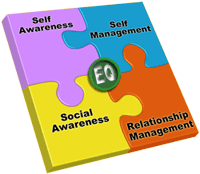Goal Setting – Powerful Written Goals In 7 Easy Steps!
by Gene Donohue
The car is packed and you’re ready to go, your first ever cross-country trip. From the White Mountains of New Hampshire to the rolling hills of San Francisco, you’re going to see it all.
You put the car in gear and off you go. First stop, the Baseball Hall of Fame in Cooperstown, New York.
A little while into the trip you need to check the map because you’ve reached an intersection you’re not familiar with. You panic for a moment because you realize you’ve forgotten your map.
But you say the heck with it because you know where you’re going. You take a right, change the radio station and keep on going. Unfortunately, you never reach your destination.
Too many of us treat goal setting the same way. We dream about where we want to go,
but we don’t have a map to get there.
What is a map? In essence, the written word.
What is the difference between a dream and a goal? Once again, the written word.
But we need to do more then simply scribble down some ideas on a piece of paper. Our
goals need to be complete and focused, much like a road map, and that is the purpose
behind the rest of this article.
If you follow the 7 steps I’ve outlined below you will be well on your way to becoming an
expert in building the road maps to your goals.
1. Make sure the goal you are working for is something you really want, not just something that sounds good.
I remember when I started taking baseball umpiring more seriously. I began to set my sites on the NCAA Division 1 level. Why? I new there was no way I could get onto the road to the major leagues, so the next best thing was the highest college level. Pretty cool, right. Wrong.
Sure, when I was talking to people about my umpiring goals it sounded pretty good, and many people where quite impressed. Fortunately I began to see through my own charade.
I have been involved in youth sports for a long time. I’ve coached, I’ve been the President of leagues, I’ve been a treasurer and I’m currently a District Commissioner for Cal Ripken Baseball. Youth sports is where I belong, it is where my heart belongs, not on some college diamond where the only thing at stake is a high draft spot.
When setting goals it is very important to remember that your goals must be consistent with your values.
2. A goal can not contradict any of your other goals.
For example, you can’t buy a $750,000 house if your income goal is only $50,000 per year. This is called non-integrated thinking and will sabotage all of the hard work you put into your goals. Non-integrated thinking can also hamper your everyday thoughts as well. We should continually strive to eliminate contradictory ideas from our thinking.
3. Develop goals in the 6 areas of life:
Family and Home
Financial and Career
Spiritual and Ethical
Physical and Health
Social and Cultural
Mental and Educational
Setting goals in each area of life will ensure a more balanced life as you begin to examine and change the fundamentals of everyday living. Setting goals in each area of live also helps in eliminating the non-integrated thinking we talked about in the 2nd step.
4. Write your goal in the positive instead of the negative.
Work for what you want, not for what you want to leave behind. Part of the reason why we write down and examine our goals is to create a set of instructions for our subconscious mind to carry out. Your subconscious mind is a very efficient tool, it can not determine right from wrong and it does not judge. It’s only function is to carry out its instructions. The more positive instructions you give it, the more positive results you will get.
Thinking positively in everyday life will also help in your growth as a human being. Don’t limit it to goal setting.
5. Write your goal out in complete detail.
Instead of writing “A new home,” write “A 4,000 square foot contemporary with 4 bedrooms and 3 baths and a view of the mountain on 20 acres of land.
Once again we are giving the subconscious mind a detailed set of instructions to work on. The more information you give it, the more clearer the final outcome becomes. The more precise the outcome, the more efficient the subconscious mind can become.
Can you close your eyes and visualize the home I described above? Walk around the house. Stand on the porch off the master bedroom and see the fog lifting off the mountain. Look down at the garden full of tomatoes, green beans and cucumbers. And off to the right is the other garden full of a mums, carnations and roses. Can you see it? So can your subconscious mind.
6. By all means, make sure your goal is high enough.
Shoot for the moon, if you miss you’ll still be in the stars. Earlier I talked about my umpiring goals and how making it to the top level of college umpiring did not mix with my values. Some of you might be saying that I’m not setting my goals high enough. Not so. I still have very high goals for my umpiring career at the youth level. My ultimate goal is to be chosen to umpire a Babe Ruth World Series and to do so as a crew chief. If I never make it, everything I do to reach that goal will make me a better umpire and a better person. If I make it, but don’t go as a crew chief, then I am still among the top youth umpires in the nation. Shoot for the moon!
7. This is the most important, write down your goals.
Writing down your goals creates the roadmap to your success. Although just the act of writing them down can set the process in motion, it is also extremely important to review your goals frequently. Remember, the more focused you are on your goals the more likely you are to accomplish them.
Sometimes we realize we have to revise a goal as circumstances and other goals change, much like I did with my umpiring. If you need to change a goal do not consider it a failure, consider it a victory as you had the insight to realize something was different.
So your goals are written down.
Now what?
First of all, unless someone is critical to helping you achieve your goal(s), do not freely share your goals with others. The negative attitude from friends, family and neighbors can drag you down quickly. It’s very important that your self-talk (the thoughts in your head) are positive.
Reviewing your goals daily is a crucial part of your success and must become part of your routine. Each morning when you wake up read your list of goals that are written in the positive. Visualize the completed goal, see the new home, smell the leather seats in your new car, feel the cold hard cash in your hands. Then each night, right before you go to bed, repeat the process. This process will start both your subconscious and conscious mind on working towards the goal. This will also begin to replace any of the negative self-talk you may have and replace it with positive self-talk.
Every time you make a decision during the day, ask yourself this question, “Does it take me closer to, or further from my goal.” If the answer is “closer to,” then you’ve made the right decision. If the answer is “further from,” well, you know what to do.
If you follow this process everyday you will be on your way to achieving unlimited success in every aspect of your life





